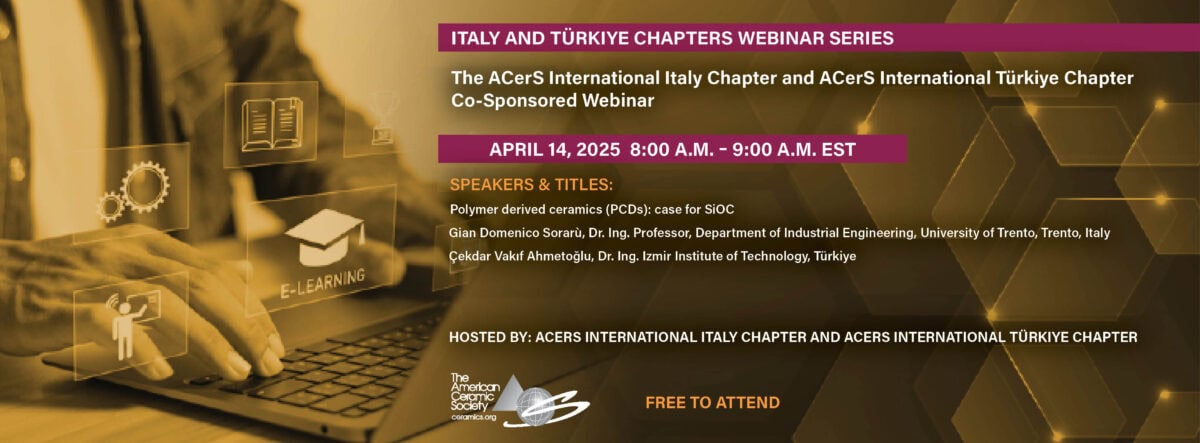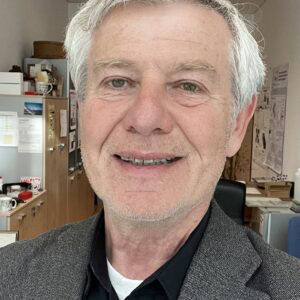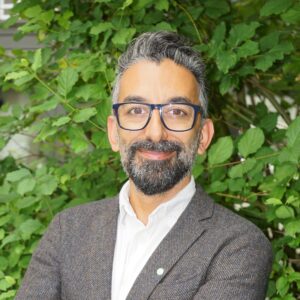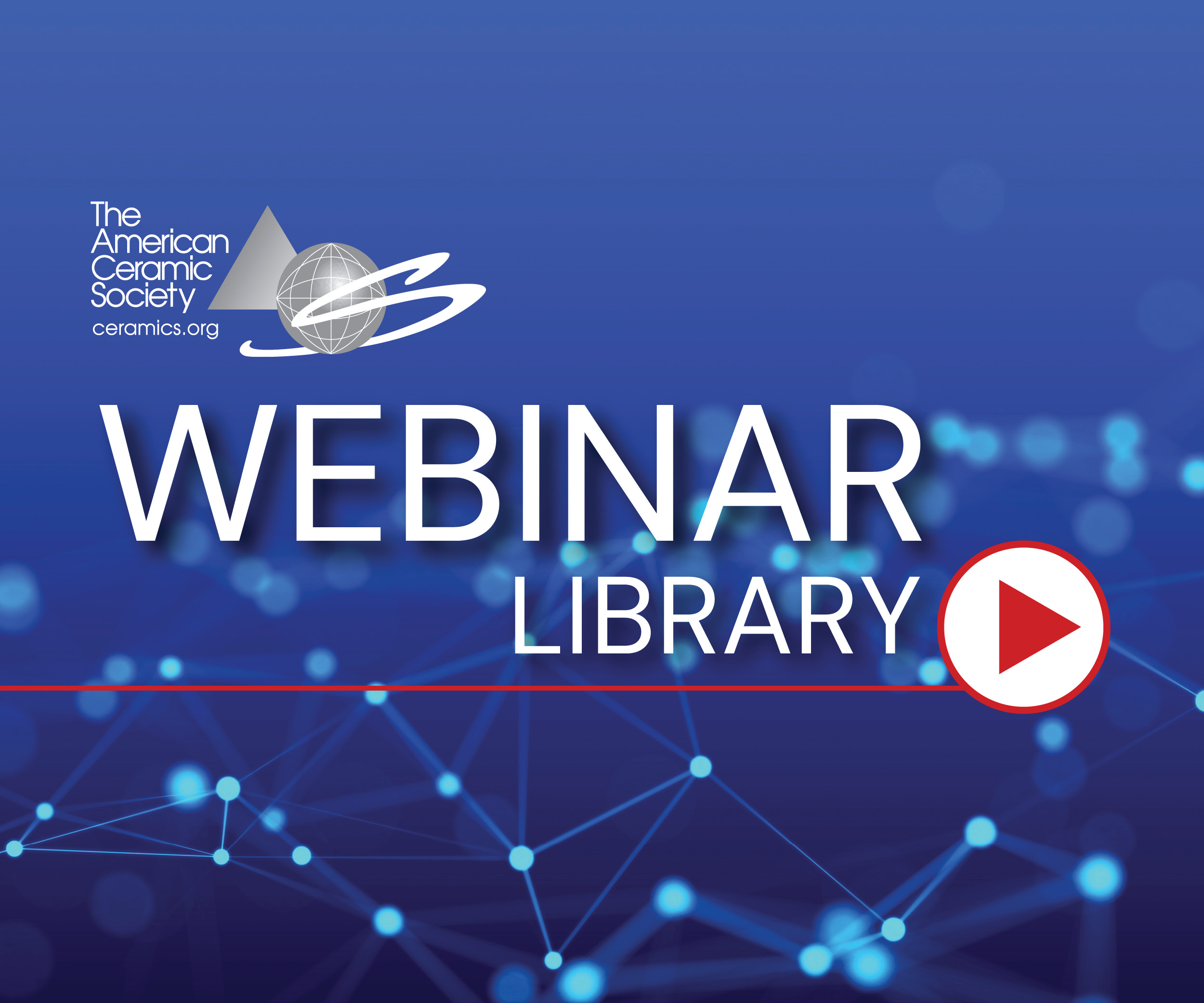Webinar Description

Hosted by: ACerS International Italy Chapter and ACerS International Türkiye Chapter
Monday, April 14, 2025; 8:00a.m. – 9:00a.m. Eastern US time
Sponsored by the ACerS International Italy Chapter and ACerS International Türkiye Chapter, the April webinar will feature two speakers: Polymer derived ceramics (PCDs): case for SiOC
DESCRIPTION
Polymer derived ceramics (PCDs): case for SiOC
Preceramic polymers represent a unique class of inorganic polymers that can be transformed into amorphous ceramics with a yield of > 70% through heat treatment in an inert atmosphere. The resulting materials from this transformation are known as polymer-derived ceramics (PDCs).
To produce a PDC, the process begins with shaping the polymer, which can either be a commercially available product or a sol-gel derived precursor. This is followed by crosslinking or gelling, and ultimately, the thermoset polymer is converted into a ceramic component through pyrolysis at elevated temperatures, typically exceeding 800 °C.
During pyrolysis, organic moieties are eliminated, i.e., mineralization or ceramization, with the breakage of C-H bonds and the release of gases like H2, CH4, and other volatile compounds. This transformation results in the formation of an inorganic material. The development of such ceramic material is characterized by a complex microstructural evolution that is influenced by factors such as thermal history, final heating temperature, the atmosphere, etc.. This leads to the formation of nano-sized crystalline phases embedded within an amorphous matrix, which may also contain a free-carbon phase.
In this seminar, we will provide an overview of polymer-derived ceramics (PDCs), focusing specifically on the Silicon Oxycarbide (SiOC) system. We will explore its intriguing features, including mechanical properties and the processing techniques used to produce aerogels.
BIOGRAPHIES

Gian Domenico Sorarù, Dr. Ing.
Gian Domenico Soraru graduated in Chemical Engineering from the University of Padova in 1980. After graduation in 1896 he became Research Assistant, in 1992 Associate Professor and in 2000 Professor of Materials Science and Engineering at the University of Trento, Italy. In 1987–1989 he joined the group of Prof. J. D. Mackenzie at UCLA (Los Angeles, USA) as postdoc where he started to be involved in the PDCs field. In 1993–1994 and 1999 he was visiting professor at the University of Paris 6 (Dr. F. Babonneau group) and in 2002 visiting scientist at the University of Colorado at Boulder (Prof. R. Raj group). In 1994, he received the first prize FEDERCHIMICA from the Italian Association of Chemical Industries. From 2006–2010 Prof. Soraru` was the coordinator of a European Marie Curie Network on Polymer-Derived Ceramics.
His current research focuses on (i) PDC aerogels (Si-O-C; Si-O-C-N) for energy and environmental application (battery materials, thermal insulators, adsorber for water cleaning) (ii) 3D printing of PDCs (iii) Toughening of soda lime glass.

Cekdar Vakif Ahmetoglu, Dr. Ing.
After earning his B.Sc. (2002) and M.Sc. (2005) in Metallurgical and Materials Engineering from the Middle East Technical University (METU, Ankara, Turkey)—the latter recognized with the Thesis of the Year Award by the Prof. Dr. Mustafa N. Parlar Education & Research Foundation—he completed his Ph.D. in polymer-derived ceramics (PDCs) under the supervision of Prof. Ing. Paolo Colombo at the University of Padova, Italy (2010). He then joined Prof. Dr. Richard E. Riman’s group at Rutgers, The State University of New Jersey, as a postdoctoral researcher, working on hydrothermal and solvothermal methods for solution crystallization and low-temperature densification of inorganic non-metallic solid materials.
A former Marie Curie fellow, he was also awarded a research fellowship by the Alexander von Humboldt (AvH) Foundation (2019) to conduct research at the Technical University of Berlin (Germany) with Prof. Dr. Aleksander Gurlo. His current research focuses on (i) materials sustainability, including the use of waste, recycled, and eco-friendly materials; (ii) green, low-energy processes for manufacturing materials traditionally requiring high-temperature synthesis; and (iii) the synthesis and processing of advanced materials, particularly the production and application of highly porous ceramic and glass components such as foams and aerogels.
REGISTRATION
If you have any questions, please contact Vicki Evans.
This webinar is brought to you by the ACerS International Italy Chapter and ACerS International Türkiye Chapter.
To view past ACerS webinars click here.
